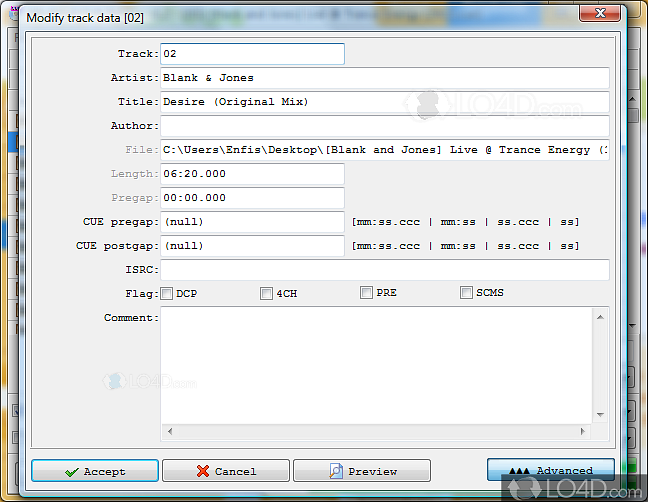
#CUE SPLITTER TO FLAC HOW TO#
This article will describe a step by step guide on how to split CUE associated APE, FLAC, MP3, WAV, WMA, and etc album, podcast or compilation into separate audio tracks. However, when I split the same file with the compression level set to 8, the size of the split files is 340 MB in total (equal to the size of the original file). APE CUE Splitter, is the versatile APE CUE Splitter software for you to split a long APE file into individual songs.

I ask this because I already tried to split a single-file FLAC album, but although the size of the original file is 340 MB, when split it with libFLAC encoder and the compression bar set to 0, the size of the split files is 397 MB in total, which means 57MB larger than the original single file. Does the different encoder options (libFLAC, FLACCL etc) affect the sound quality? And most importantly, how should I handle the "Compression Level" bar? I have single-file FLAC album which I want to split up in individual FLAC files for each track using CUE tools but without hurting the sound quality. If possible I'd like to ask something on the same topic: TITLE=$(metaflac -show-tag=TITLE "$flacfile" | sed 's/.FILE "01 - China Cat Sunflower -].wav" WAVEįILE "04 - Estimated Prophet -].wav" WAVEĢ.) I deleted out the FLAC tracks, so I only have the one single CUE file with all tracks in one.ģ.) I only used notepad to edit the CUE file. To review, open the file in an editor that reveals hidden Unicode characters.

PERFORMER=$(metaflac -show-tag=ARTIST "$flacfile" | sed 's/.*=//') cuetoflac.py This file contains bidirectional Unicode text that may be interpreted or compiled differently than what appears below. TRACK=$(metaflac -show-tag=TRACKNUMBER "$flacfile" | sed 's/.*=//') # Get track number, performer, and title from file tags # Loop through each flac file in the current directory # Initialize variables for cumulative timeĮcho "REM COMMENT $COMMENT" > "$CUEFILE"Įcho "PERFORMER \"$PERFORMER\"" > "$CUEFILE" TITLE=$(metaflac -show-tag=ALBUM "$flac_file" | cut -d= -f2)ĭATE=$(metaflac -show-tag=DATE "$flac_file" | cut -d= -f2)ĬOMMENT=$(metaflac -show-tag=COMMENT "$flac_file" | cut -d= -f2) PERFORMER=$(metaflac -show-tag=ARTIST "$flac_file" | cut -d= -f2) # Get the header information from the FLAC file # Get the first FLAC file in the directory # 3) Run the bash script (you may need to mark it as executable) #INSTRUCTIONS: 1) Save this code as create_cue.sh If you deleted all the flac files and have nothing left but the CUE file, you have no audio files to process. The best Mac alternative is X Lossless Decoder, which is both free and Open Source. 2.) I deleted out the FLAC tracks, so I only have the one single CUE file with all tracks in one.The CUE is only a text file used to provide information to a program about the audio files.
#CUE SPLITTER TO FLAC FOR MAC#
#written with significant help from ChatGPT Medieval CUE Splitter is not available for Mac but there are a few alternatives that runs on macOS with similar functionality.

#CUE SPLITTER TO FLAC INSTALL#
#if this doesn't work, you may need to install flac: I did a lot of trial and error (with some big assistance from ChatGPT) and wrote a bash script that does exactly this. I couldn't get the other solutions to work, either. I tried the foobar2000 route, but unfortunately, it didn't accurately print the INDEX variable for each track.


 0 kommentar(er)
0 kommentar(er)
